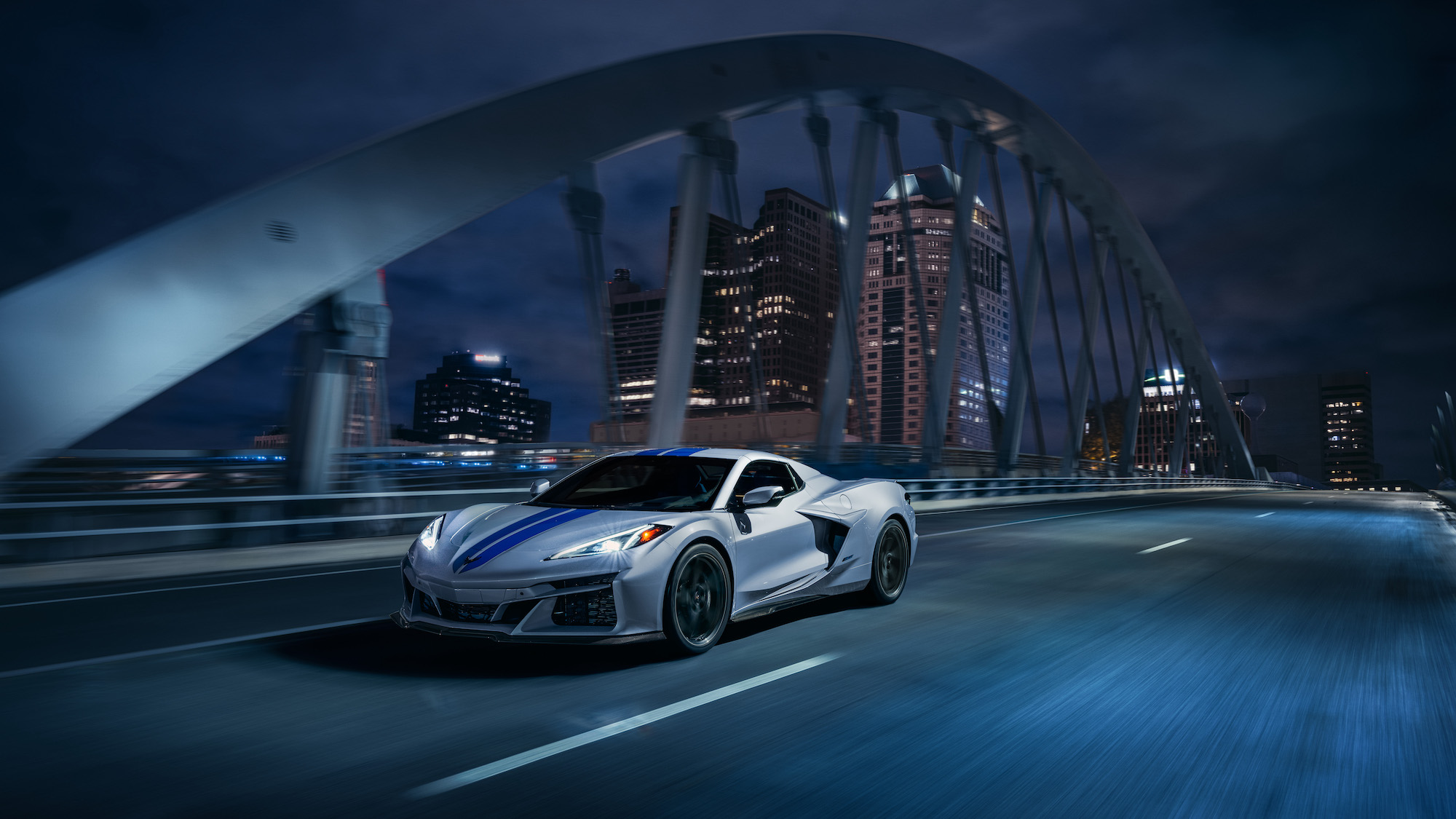

It was just a few short years ago that Chevrolet debuted the first mid-engine version of its venerable all-American Corvette. After more than six decades punctuated with whispers and rumors, the mid-engine ‘Vette was finally a reality, and it was all-new from the ground up for model year 2020. That eighth generation (commonly called C8) Corvette was touted as the quickest one in history, leveraging better weight distribution and improved responsiveness.
Now Chevy has done it again, launching a new sports car on January 17 that shakes up the market. The 2024 Corvette E-Ray is electrified for the first time in the car’s history, moving the General Motors company toward its electrification goals.
Here’s how we got here.
Seven decades of power
General Motors set hearts aflutter back in 2015 when it filed an application to patent the name E-Ray. Eight years later, the hybrid sports car is finally a reality. In fact, the E-Ray was launched 70 years to the day after the first Corvette prototype debuted at Motorama in New York City on January 17, 1953. Every one of the first batch of Corvettes was white with a red interior, only available with a convertible top.
While the Corvette is best known for its roaring V8, the first ‘Vette was built on a modified passenger car chassis and was propelled by a 3.9-liter inline-six engine called the “Blue Flame.” In 1955, Chevy upped the ante with a 4.3-liter V8 making 195 horsepower paired with a three-speed manual.
[Related: Behind the wheel of the most technically advanced Corvette on the market]
In 1966, the Corvette was the first to get the 427 cubic-inch engine, one of several powertrain options that included a 300-horsepower small-block 327 cubic-inch engine along with the larger 427, which came in 350-, 390-, and 425-horsepower versions. With stats like these, it’s no surprise that the Corvette’s appeal has grown through the decades with everyone from early astronauts like Alan Shepard to President Joe Biden counted as fans.
In 2019, the last year of the front-engine Corvette, the car was available with a 6.2-liter naturally aspirated V8 in 455- and 460-horsepower flavors. The Z06 came with a supercharged version making 650 horsepower and the even fiercer ZR1 was good for 755 horsepower and 715 pound-feet of torque.
As for the forthcoming E-Ray, it pairs the 6.2-liter V8 from the gas-powered mid-engine 2022 model (called Stingray, a term that has been in the Corvette family since the 1960s) with an electric motor for a total power output of 655 horsepower and 630 pound-feet of torque. This combination gives the E-Ray all-wheel drive, and the brand says the E-Ray is the quickest production Corvette in history, boasting an impressive zero-to-60 miles per hour time of 2.5 seconds.
The E-Ray is a heavyweight
That very first Corvette weighed less than 2,900 pounds. Over the decades, Chevy’s sports car has steadily gained heft, tipping the scales at about 3,600 pounds in 2020. Electrified powertrains like the one in the E-Ray are heavier than gas-only engines, requiring revised calculations for everything from the frames to the axles to the wheels and tires.
Chevrolet says the coupe version of the E-Ray will weigh in at 3,980 pounds, and the convertible adds 76 pounds for a total of 4,056. That’s a heavyweight sports car, compared to McLaren’s plug-in hybrid Artura at 3,303 pounds. It’s still lighter (and exponentially less expensive) than the ultra-exclusive all-electric $2 million Rimac Nevera, which is 4,750 pounds.
[Related: Strapping into the 2020 Chevrolet Corvette Stingray to take turns at 1.3 Gs]
Starting at about $60,000, the reimagined mid-engine 2020 Stingray was a shockingly affordable American stunner. The E-Ray, however, starts at a whopping $104,295 and tops out at $120,000 or more with options.
While it may not be as destined to be as affordable for the masses as the gas-only Stingray, it still handily beats the price of rivals such as McLaren’s Artura and the Ferrari 296 GTB. Plus, the E-Ray doesn’t require a plug like the McLaren and Ferrari; the E-Ray’s small 1.9-kilowatt battery pack regenerates energy when the car slows and brakes. Unlike an all-electric vehicle, the hybrid E-Ray leans heavily on the gas-powered engine and uses the battery to increase torque and conserve fuel.
Stealth mode and more
The E-Ray will also have a lower and wider stance; it’s 3.6 inches wider overall than the Stingray and offers a bit more elbow room. Plus, the tech of the new electric motor will affect how this iconic vehicle sounds.
Believe it or not, the delightful roar of a V8 isn’t music to everyone’s ears. When in hybrid mode, the Corvette will retain its distinctive growl. However, those who prefer a less-flashy approach in the neighborhood will appreciate Stealth Mode, which is a quiet all-electric drive mode that operates up to 45 miles per hour (let’s hope that doesn’t surprise pedestrians).
EVs are quiet by nature, but automakers like Ford have created ways to make gas-powered vehicles quieter as well. You might remember the debut of Ford’s “Good Neighbor Mode” on the 2018 Mustang, which muffled the muscle car’s voice by adapting the active exhaust function.
As the US continues to explore new ways to bolster the EV infrastructure in terms of charging stations and alternate energy, the E-Ray is timed perfectly. While this iteration doesn’t ever need to be charged because it’s a hybrid, we expect to see an all-electric version next.
In the meantime, expect to see the 2024 Corvette E-Ray available for sale later this year.
